
 i_need_contribute
i_need_contribute

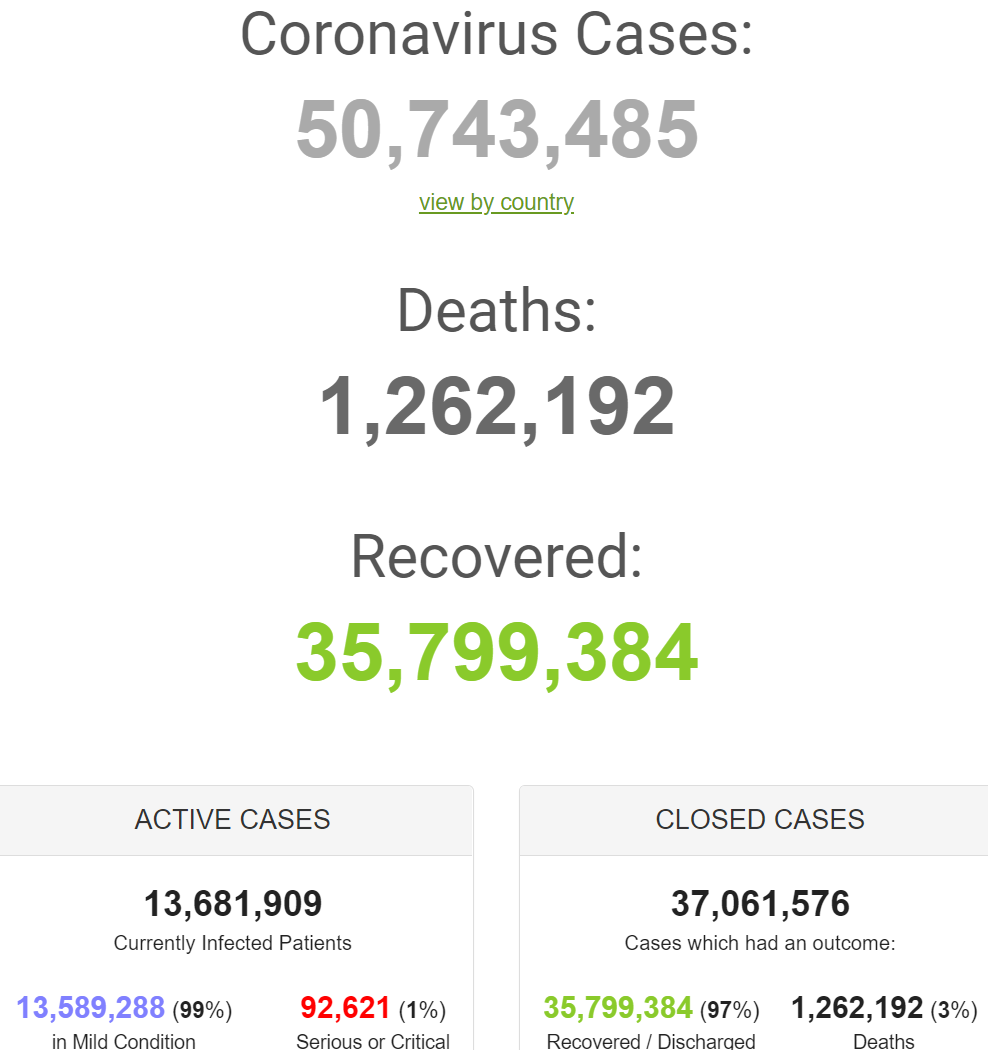
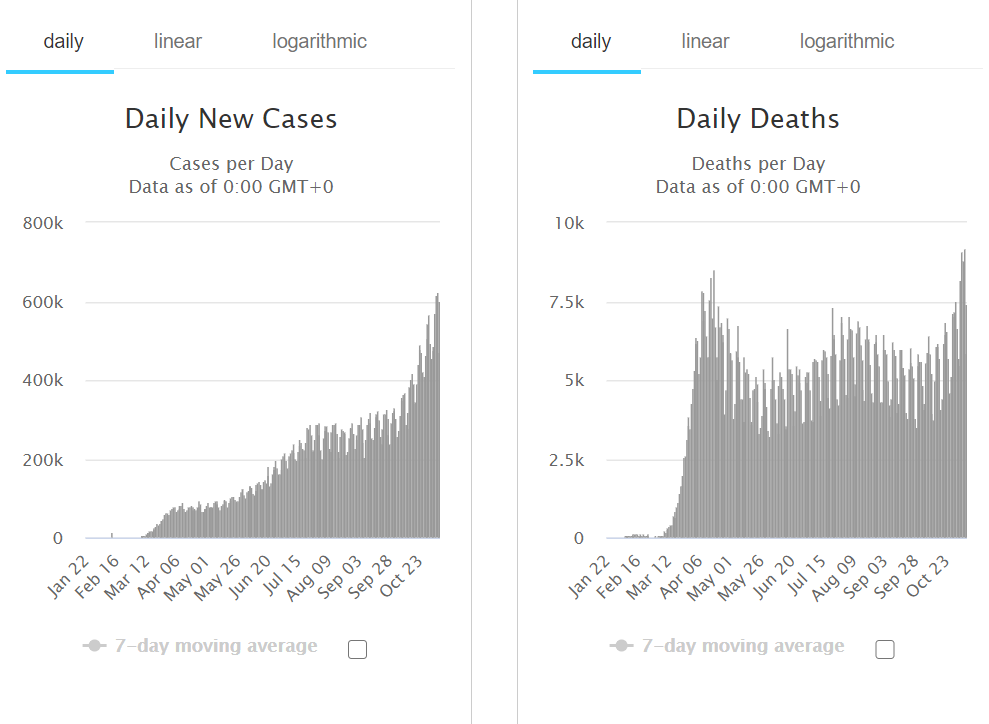
|
Country, |
Total |
New |
Total |
|
World |
50,723,000 |
+472,686 |
1,261,747 |
|
10,288,480 |
+102,726 |
243,768 |
|
|
8,553,864 |
+46,661 |
126,653 |
|
|
5,664,115 |
+10,554 |
162,397 |
|
|
1,787,324 |
+38,619 |
40,439 |
|
|
1,774,334 |
+20,498 |
30,537 |
|
|
1,388,411 |
+22516 |
38,833 |
|
|
1,242,182 |
+5,331 |
33,560 |
|
|
1,192,013 |
+20,572 |
49,044 |
|
|
1,143,887 |
+7,440 |
32,791 |
|
|
961,938 |
+6,810 |
94,808 |
|
|
935,104 |
+32,616 |
41,394 |
|
|
922,333 |
+2,323 |
34,879 |
|
|
737,278 |
+1,372 |
19,809 |
|
|
682,486 |
+9,236 |
38,291 |
|
|
672,507 |
+14,026 |
11,505 |
|
|
546,425 |
+24,785 |
7,872 |
|
|
521,558 |
+1,581 |
14,543 |
|
|
498,549 |
+2,530 |
11,327 |
|
|
494,168 |
+6,124 |
12,907 |
|
|
460,331 |
+9,397 |
8,450 |
|
|
437,716 |
+3,880 |
14,614 |
|
|
420,238 |
+1,474 |
6,067 |
|
|
414,828 |
+3,608 |
4,858 |
|
|
410,065 |
+5,664 |
8,004 |
|
|
396,395 |
+2,442 |
7,539 |
|
|
394,255 |
+2,516 |
10,887 |
|
|
350,592 |
+363 |
5,540 |
|
|
343,189 |
+1,436 |
6,968 |
|
|
319,241 |
+292 |
2,674 |
|
|
303,751 |
+6,752 |
7,879 |
|
|
264,113 |
+4,058 |
10,522 |
|
|
256,781 |
+4,596 |
4,272 |
|
|
194,453 |
+2,817 |
1,108 |
|
|
179,324 |
+5,784 |
2,896 |
|
|
174,907 |
+1,421 |
12,830 |
|
|
153,153 |
+5,933 |
1,411 |
|
|
142,427 |
+84 |
8,790 |
|
|
142,143 |
+1,111 |
514 |
|
|
139,527 |
+1,021 |
2,798 |
|
|
134,203 |
+190 |
232 |
|
|
131,743 |
+538 |
811 |
|
|
Dominican |
130,182 |
+537 |
2,265 |
|
118,140 |
+973 |
1,301 |
|
|
116,162 |
+723 |
1,857 |
|
|
111,262 |
+212 |
3,821 |
|
|
109,616 |
+4,673 |
2,438 |
|
|
109,321 |
+4,519 |
1,233 |
|
|
109,201 |
+239 |
6,368 |
|
|
107,086 |
+1,172 |
1,812 |
|
|
106,424 |
+2,175 |
1,559 |
|
|
106,279 |
+996 |
1,007 |
|
|
100,041 |
+465 |
2,745 |
|
|
99,675 |
+474 |
1,523 |
|
|
94,883 |
+185 |
826 |
|
|
94,236 |
+1,139 |
723 |
|
|
86,212 |
+28 |
4,634 |
|
|
83,456 |
+192 |
329 |
|
|
82,346 |
+671 |
1,893 |
|
|
75,495 |
+1,828 |
351 |
|
|
75,160 |
+675 |
1,665 |
|
|
71,119 |
+1,576 |
1,873 |
|
|
68,730 |
+363 |
585 |
|
|
68,117 |
+1,078 |
929 |
|
|
67,589 |
+648 |
1,490 |
|
|
67,247 |
+2,543 |
794 |
|
|
65,411 |
+1,663 |
840 |
|
|
65,394 |
+539 |
1,947 |
|
|
64,090 |
+300 |
1,154 |
|
|
62,819 |
+515 |
1,177 |
|
|
62,747 |
+2,112 |
890 |
|
|
62,488 |
+719 |
1,111 |
|
|
62,051 |
+670 |
2,048 |
|
|
61,377 |
+1,029 |
1,420 |
|
|
58,158 |
+501 |
515 |
|
|
58,056 |
+2 |
28 |
|
|
57,753 |
+2,901 |
475 |
|
|
56,698 |
+1,889 |
784 |
|
|
55,121 |
+891 |
743 |
|
|
49,102 |
+198 |
320 |
|
|
45,161 |
+890 |
554 |
|
|
40,209 |
+852 |
286 |
|
|
39,760 |
+978 |
1,136 |
|
|
27,658 |
+6 |
907 |
|
|
27,427 |
+143 |
478 |
|
|
24,732 |
+489 |
285 |
|
|
24,699 |
+1,980 |
207 |
|
|
24,206 |
+501 |
559 |
|
|
23,051 |
+570 |
188 |
|
|
22,805 |
+426 |
337 |
|
|
22,421 |
+79 |
433 |
|
|
20,832 |
+19 |
126 |
|
|
17,797 |
+412 |
362 |
|
|
17,223 |
+112 |
249 |
|
|
16,954 |
+46 |
349 |
|
|
15,708 |
+15 |
326 |
|
|
14,403 |
+337 |
132 |
|
|
14,090 |
+57 |
1,115 |
|
|
13,211 |
+41 |
134 |
|
|
12,433 |
+98 |
307 |
|
|
5,987 |
+116 |
28 |
|
|
5,239 |
+5 |
113 |
|
|
4,600 |
+11 |
40 |
|
|
3,837 |
+7 |
60 |
Retrieved from: https://www.worldometers.info/coronavirus/
From Angus Watson in Sydney
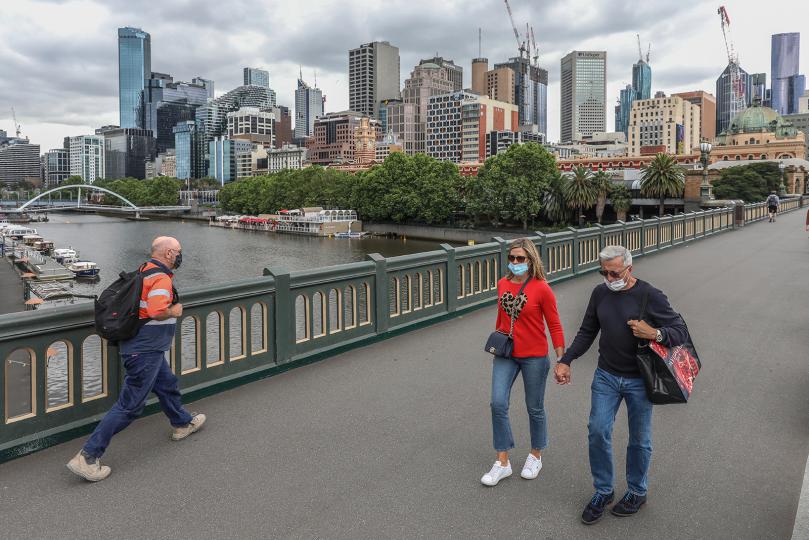
A general view of pedestrians crossing the bridge with the Yarra River and CBD in the background in Melbourne, Australia, on November 06. Asanka Ratnayake/Getty Images
Residents of the Australian city of Melbourne can travel freely within the state of Victoria after a so-called "ring of steel" around the city was removed on Monday.
The "ring of steel," as locals called the tough Covid-19 restrictions, consisted of checkpoints manned by police and other officials, and separated Melbourne from the rest of the state throughout the bulk of the city’s 112-day lockdown.
The state government has also dropped a previous restriction preventing Melbourne residents from traveling further than 25 kilometers (15.5 miles) from their homes.
Movie theaters, galleries, museums and music halls will now be able to open, with 20 people allowed per space.
What happened this summer: Restrictive measures were put in this summer, when Melbourne and the rest of the state of Victoria were recording hundreds of cases per day -- becoming the epicenter of Australia's Covid-19 outbreak. Though the decision to lock down Victoria was unpopular with some people, by late September, cases had declined to low double digits, allowing the government to begin lifting restrictions.
Melbourne has not recorded a new Covid-19 case since October 29, the week its lockdown ended. Neighboring New South Wales on Monday also said it had not detected any new cases detected in the previous 24 hours.
From CNN's Maggie Fox
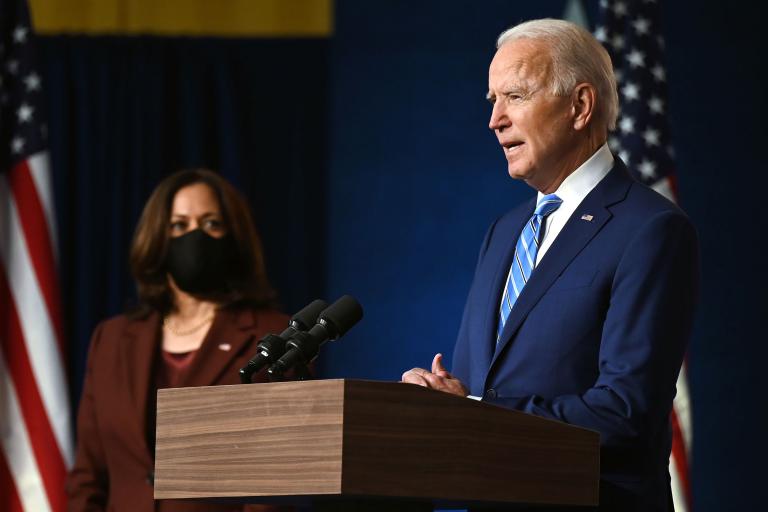
Joe Biden and Kamala Harris speak at the Chase Center in Wilmington, Delaware, on November 4. Jim Watson/AFP/Getty Images
Tackling the pandemic in the US is the first item on the Biden-Harris transition team’s website.
The US President-elect and vice president-elect pledge to ensure free, reliable testing for all Americans, a better supply of personal protective equipment, clear and consistent guidance and a $25 billion vaccine manufacturing and distribution plan.
The Biden team also plans to appoint Harris to head a task force to tackle racial and ethnic disparities regarding the impact of the virus.
The team plans to draw up a “nationwide Pandemic Dashboard that Americans can check in real-time to help them gauge whether local transmission is actively occurring in their zip codes.”
The Biden team said their White House will “immediately restore our relationship with the World Health Organization, which — while not perfect — is essential to coordinating a global response during a pandemic."
The team also intends to restore the Obama-era White House National Security Council Directorate for Global Health Security and Biodefense, which was disbanded in 2018.
The website also promises a national mask mandate but says it will get there by working with governors and mayors and “by asking the American people to do what they do best: step up in a time of crisis.”
The Trump Administration invested heavily in vaccine development and promised any approved coronavirus vaccine would be provided free of cost to all Americans. But the White House also struggled to deploy enough tests and PPE to those that needed it.
The current administration has also publicly battled with the Centers for Disease Control and Prevention (CDC) about coronavirus guidance.
The US is approaching 10 million diagnosed coronavirus cases (the CDC says the majority of cases have gone undiagnosed) and a quarter of a million deaths.
On Saturday, Johns Hopkins University reported 126,742 daily new coronavirus cases in the US, the highest single daily count reported since the pandemic began.
Retrieved from: https://edition.cnn.com/world/live-news/coronavirus-pandemic-11-09-20-intl/index.html
By Chico Harlan and Stefano Pitrelli
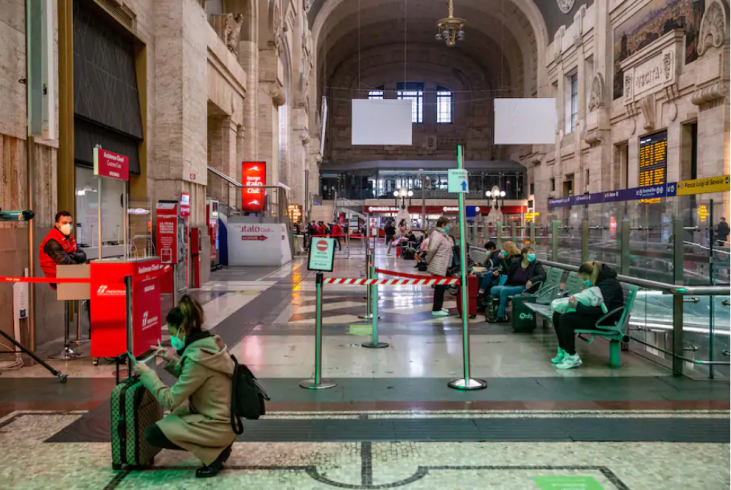
Travelers fill out declaration forms Friday at the central railway station in Milan. (Francesca Volpi/Bloomberg News)
But now that Italy has been caught up in Europe’s second wave, startled by the virus once more, pride has given way to recriminations and a crisis of confidence. There’s a growing sense that the country and the continent misplayed their second chance.
“You can’t treat the coronavirus like a hurricane,” hunkering down and expecting the problems to be gone, said Neil Ferguson, an epidemiologist at Imperial College London. “It’s intimately tied with the contacts in society. No European country got close to New Zealand-like levels. The virus was always sitting there, ready to resurge if contact rates increased.”
Government advisers and those who study infectious diseases say tight lockdowns in the spring tamped down virus transmission in Europe for months, while covering up shortcomings that have now come fully into view. Those experts say the outbreaks now engulfing the continent were seeded by a summer of borderless travel, with countries such as Italy eager to salvage lost tourism earnings.
In the rush to reclaim normalcy, creative ideas for how to remake society for the pandemic failed to take hold. Experts advising the Italian government had recommended that factories and other workplaces stagger start times to eliminate rush-hour peaks. They said shops should consider longer hours to reduce crowding. Apps would track infections and perform contact tracing in a way humans never could.
But too few people downloaded the apps to make them useful. Contact tracing collapsed as cases again started to surge. The buses in Rome and Milan were crammed during rush hour.
Italy is now among more than two dozen countries in Europe that are faring worse than the United States, with more per-capita cases and deaths. Several European nations have returned to shutdown mode. Italy has instituted a nationwide curfew and sealed off several major regions — the kind of economy-wrecking measures it had hoped were over. Italian Prime Minister Giuseppe Conte had said in August that the country would be able to deal with any future increases in cases without limits on “economic activity.”
Retrieved from: https://www.washingtonpost.com/world/europe/italy-covid-lockdown-reopening/2020/11/07/312f4792-1cbc-11eb-ad53-4c1fda49907d_story.html
By RAF CASERT Associated Press
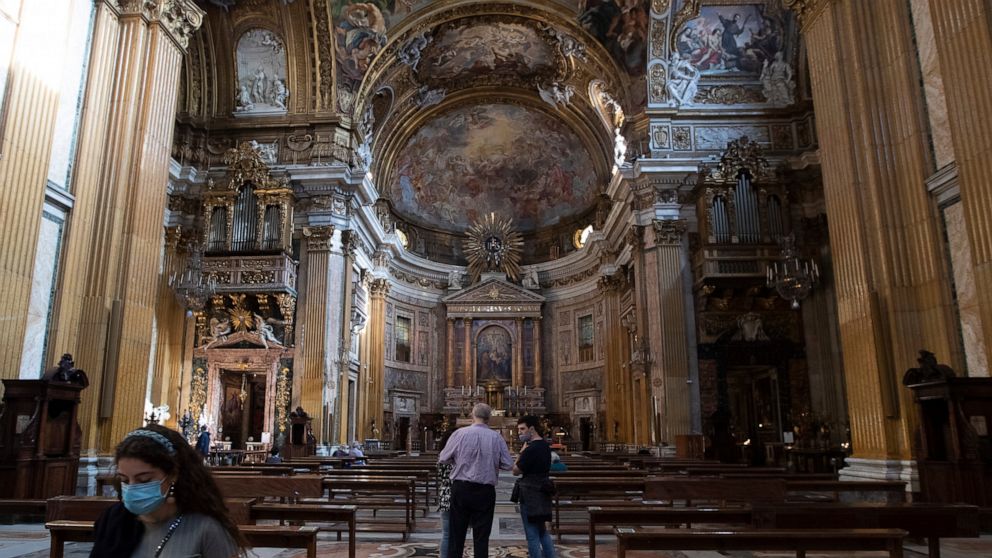
People visit the Chiesa del Gesu church in Rome, Friday, Nov. 6, 2020. In times when a pandemic unleashes death and poverty, the concept of what is essential to keep society functioning in a lockdown is gripping Europe. What may stay open in one country may be designated as non-essential just across the border. Churches in Italy have stayed open, but require social distancing.
HALLE, Belgium -- In times when a pandemic unleashes death and poverty, the concept of what is essential to keep society functioning in a lockdown is gripping Europe.
Beyond the obvious — food stores and pharmacies — some answers in the patchwork of nations and cultures that make up Europe can approach the surreal. What is allowed on one side of a border can be banned just a brief stroll down the road, on the other.
German Chancellor Angela Merkel said that while it might seem fairest to just shut everything down, “it's perhaps not the most practical” solution.
“If people are only satisfied when everything possible is shut down, then that’s a view which naturally doesn’t make economic sense,” Merkel said.
That's why Germany is keeping car dealerships open this time, after their closure in the first, spring lockdown hurt the country's huge automobile industry.
In Belgium, of course, chocolate shops are staying open.
“Chocolate is very much an essential food around here," said chocolatier Marleen Van Volsem at the Praleen chocolaterie south of Brussels. “It has to be. Because chocolate makes you happy."
Happiness would seem no subject to split hairs about. Yet consider how differently Italy and Britain treat a service that gladdens many a heart.
In the country that coined the term “bella figura” — the art of cutting a fine figure — hairdressers are deemed essential.
“Italians really care about their image and about wellness,”″ said Charity Cheah, the Milan-based co-founder of TONI&GUY Italy. “Perhaps psychologically, the government may feel that going to a salon is a moment of release from stress and tension, a moment of self-care, that citizens need.”
But across England people have had to scramble to get their hair done in the last days and hours while they still could, before new pandemic restrictions came into force on Thursday.
“The thought of another lockdown and being stuck at home — (people thought) I’m going to throw caution to the wind and I am just going to come in and have my hair done,” said Richard Ward, managing director at the Richard Ward Hair and Metro Spa on London's swank Sloane Square.
And then there are life's finer pleasures.
In France, the love of books is unquestioned. No country has more Nobel Prize-winners in Literature, and a book review program on TV like Apostrophes used to be watched by millions every week. But walk the streets of Paris and you will find bookshops closed.
Sylvia Whitman, who runs the famed Shakespeare and Co. bookstore on the Left Bank, seethes at the prospect of giant online platforms gobbling up business while her shop is shuttered. Her sales have dropped 80% since the the spring lockdown.
“I find it really tiring that the bigger you are the more you can ignore laws, you can avoid taxes, you can find loopholes," she said. “The smaller you are, the more expensive and the more complicated things are. “
Across the border in Belgium, books were deemed essential. Even then, Wouter Cajot, owner of the 't Stad Leest in the port of Antwerp finds it a mixed blessing. The lockdown has reduced passing shoppers to a trickle and he will have to decide whether heating and personnel costs make it worth his staying open.
But when essential goods cannot be bought in a store they can still be delivered.
“During the first lockdown we had to invent a website in three days and nights," said Cajot, and he got “new logistical equipment — a cargo bike," to the delight of his Antwerp clients who get books delivered within hours of placing their order. “So why order books at an international online giant when the corner bookstore can deliver same-day by bike?"
That's also become a question of government policy. With small shops often forced to suspend operations, and drifting closer to bankruptcy as a result, the door is wide open for supermarket chains and online giants to pounce. Several countries have taken steps to ensure supermarkets during lockdown cannot sell many products that provide the livelihood of closed shops.
It can get very complicated, with some supermarkets forced to tape off sections of their merchandise. In Belgium, Christmas decorations which took weeks to set up may now be hidden from view, since retail stores cannot sell them, as they are deemed non-essential.
“Books and magazines are allowed," said Harry Decraene, manager of a Carrefour department west of Brussels. "DVDs, CDs and games are not allowed. Sewing equipment is allowed, stationery is allowed, garden equipment can be sold. Pots and pans, toys and Christmas supplies are not allowed.”
Just as toys would seem essential for children, petanque — France's traditional outdoors game that involves mostly elderly players tossing metal balls with leisurely accuracy — might be considered a must for the country's retirees.
There is nothing quite like the petanque grounds of the Provencal village of Saint-Paul-de-Vence, where the likes of actors Yves Montand and Lino Ventura would click their balls on the dirt. Now they're deserted, as the government opined that petanque is not essential.
“It’s a leisure activity, we can do without it,” said Sandrine Leonard, who manages the local tourism information center. Now that dead leaves provide the color the sun usually does, “it’s more a period to stay quietly at home, to do some cooking. We spend less time outdoors. Hence the importance of having a good book.”
Retrieved from: https://abcnews.go.com/International/wireStory/books-hairdressers-europeans-split-lockdown-essentials-74072427
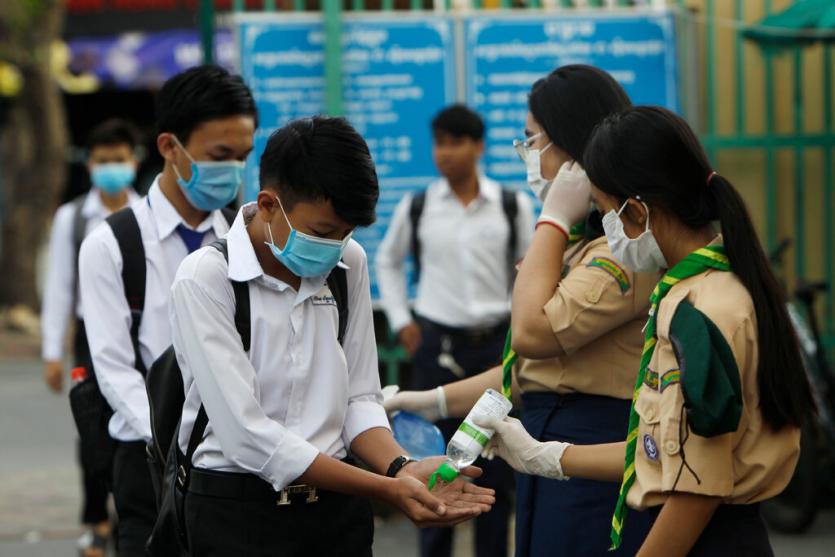
Students disinfecting their hands before class at Santhormok High School in Phnom Penh, Cambodia, earlier this month
Schools in a province that includes Cambodia’s capital, Phnom Penh, will shut again for two weeks to curb any potential spread of coronavirus from Hungary’s foreign minister, who led a delegation to the Southeast Asian country last week and tested positive for coronavirus the day he left.
The country is anxious to keep the virus out. It has logged only 294 coronavirus cases for the entirety of the pandemic and no deaths, according to a Times database.
The schools, which closed in March, had a limited reopening last Monday. But now, as a precaution, classes at public and private schools in Kandal Province will move back online, the education ministry said, according to local media. The authorities decided on the closures after officials were unable to gather sufficient information from about 900 parents and guardians of students who interacted with the Hungarian delegation during the visit.
The Hungarian foreign minister, Peter Szijjarto, met with Cambodian officials, including the Prime Minister Hun Sen of Cambodia, on Tuesday, the last day of the visit. Mr. Szijjarto then flew to Thailand, where he tested positive. He was quarantined and evacuated back to Hungary on Wednesday. So far, only a Cambodian bodyguard who had contact with Mr. Szijjarto has tested positive, the Cambodian health ministry said on Saturday.
But the Cambodia’s prime minister, Hun Sen, said the country should take no risks.
“I regard this matter as a severe problem for Phnom Penh, and I ask the Phnom Penh authority, the health sector, ministries, institutions and media covering Szijjarto to quarantine their staff,” Mr. Hun Sen said, according to the Phnom Penh Post on Sunday. “If not, the risk is very high for our country.”
Prime Minister Hun Sen said that he had tested negative, and that he and other ministers who met Mr. Szijjarto would quarantine for two weeks.
He also described the precautions he was taking to the Phnom Penh Post, including reducing time in his office and at home staying largely in two rooms. He said all documents that he received or sent were sprayed with antiseptic, and that workers at his house wore gloves.
Here’s a quick round-up of recent events.
· The number of coronavirus cases worldwide has passed 50 million, according to the Johns Hopkins University tracker, which shows that the US, India and Brazil have the highest figures. More on that here.
· France reported a further 38,619 coronavirus cases on Sunday, bringing the country’s total to 1,787,324. It follows a record daily increase on Saturday, when a staggering 86,852 cases were logged.
· Algeria’s president, Abdelmadjid Tebboune, has responded well to coronavirus treatment after being hospitalised 13 days ago.
· Greece has reported a record daily rise of 35 coronavirus deaths, and 1,914 new cases of the virus. The authorities announced 34 deaths on Saturday.
· Hundreds of protesters gathered in central Manchester on Sunday to object against the national lockdown in England, resulting in four arrests and several fines.
· Italy has registered 32,616 new coronavirus infections over the past 24 hours, the health ministry said on Sunday, down from 39,811 on Saturday.
· The US Centers for Disease Control and Prevention (CDC) reported a further 93,811 coronavirus cases on Sunday, bringing the total to 9,808,411. It follows a string of record figures, with the country tallying more than 100,000 new cases for four consecutive days.
· The UK has reported 20,572 new infections and 156 deaths, taking the country’s caseload to 1,192,013 and its official toll to 49,044.